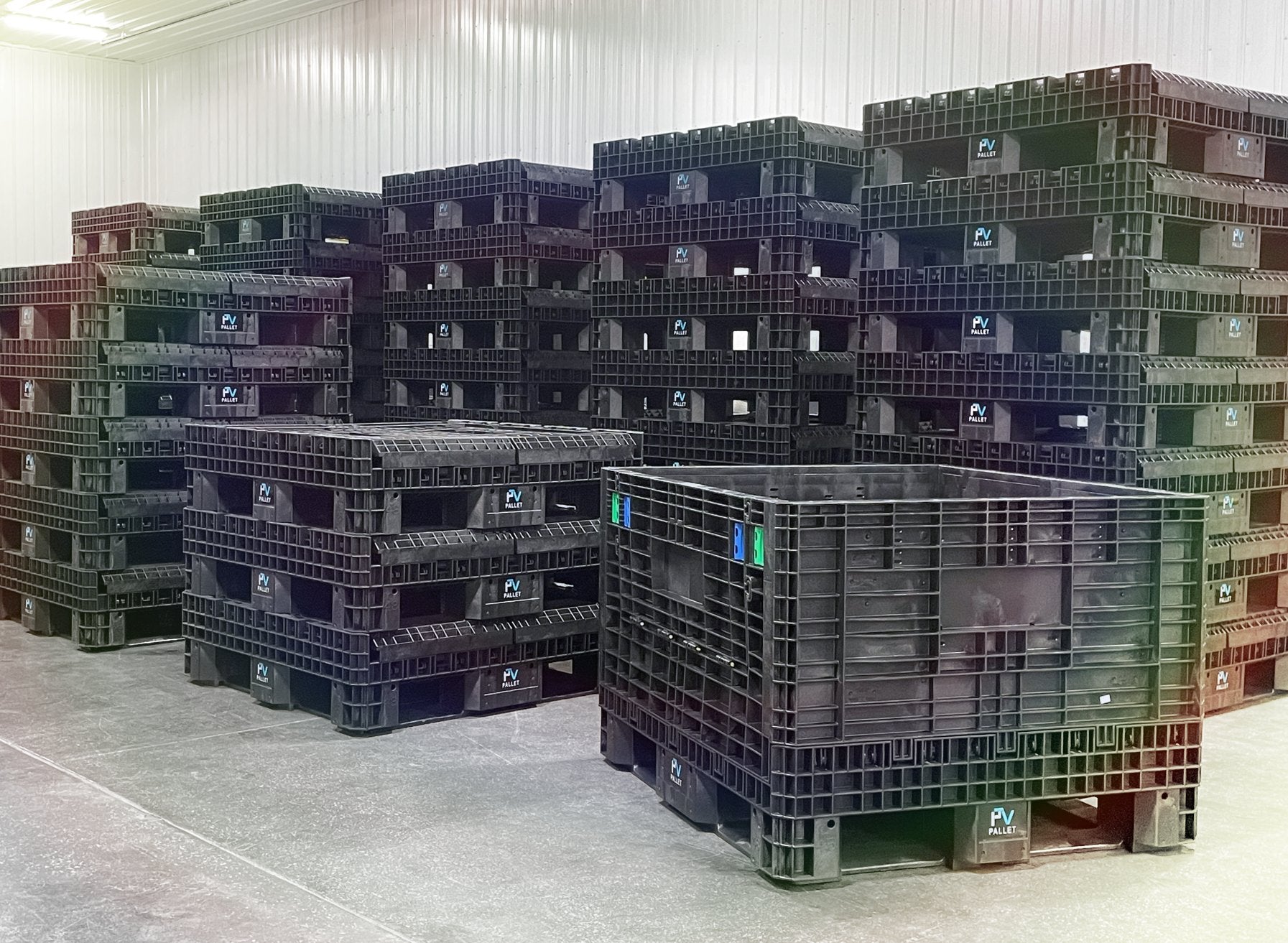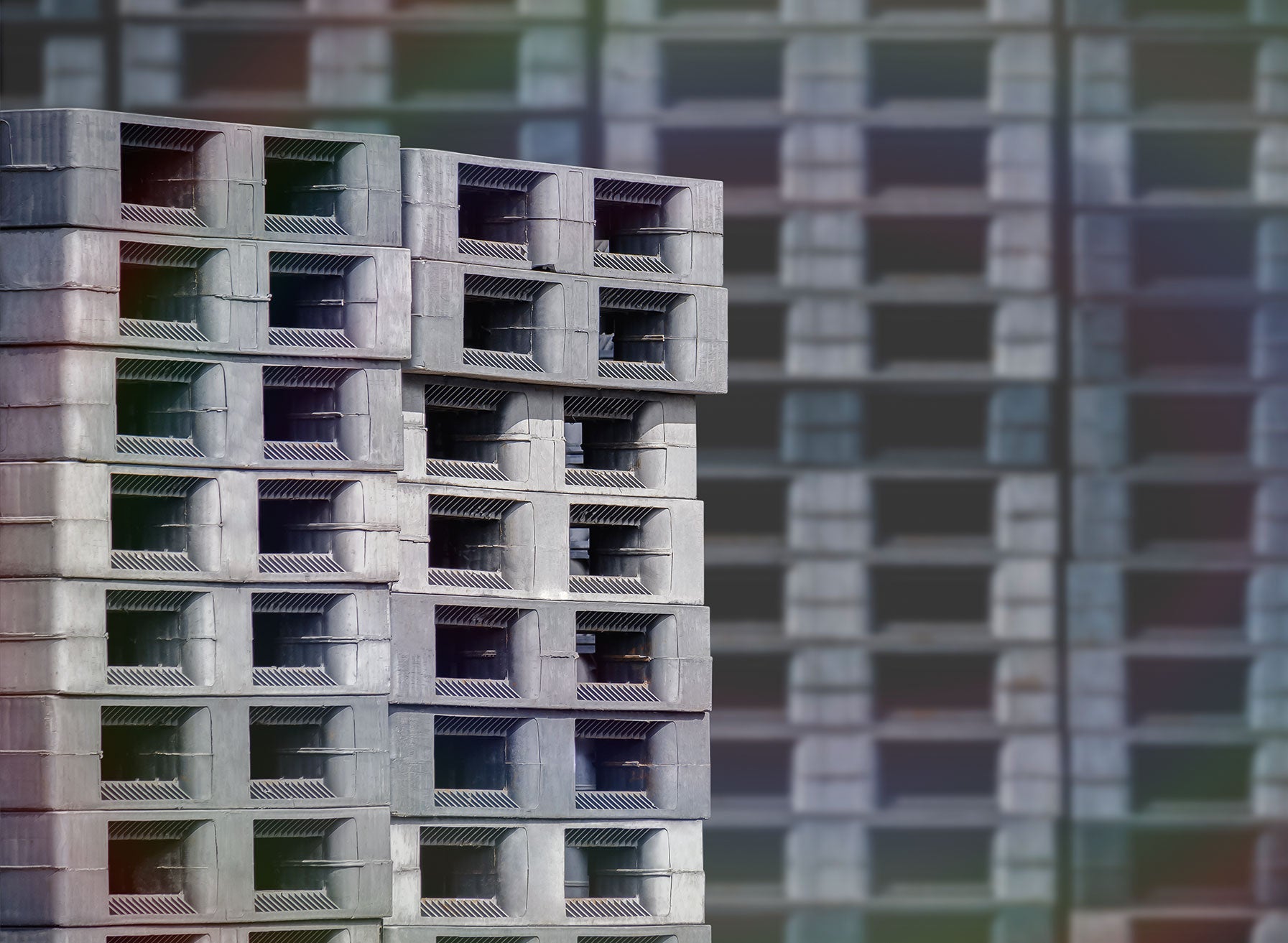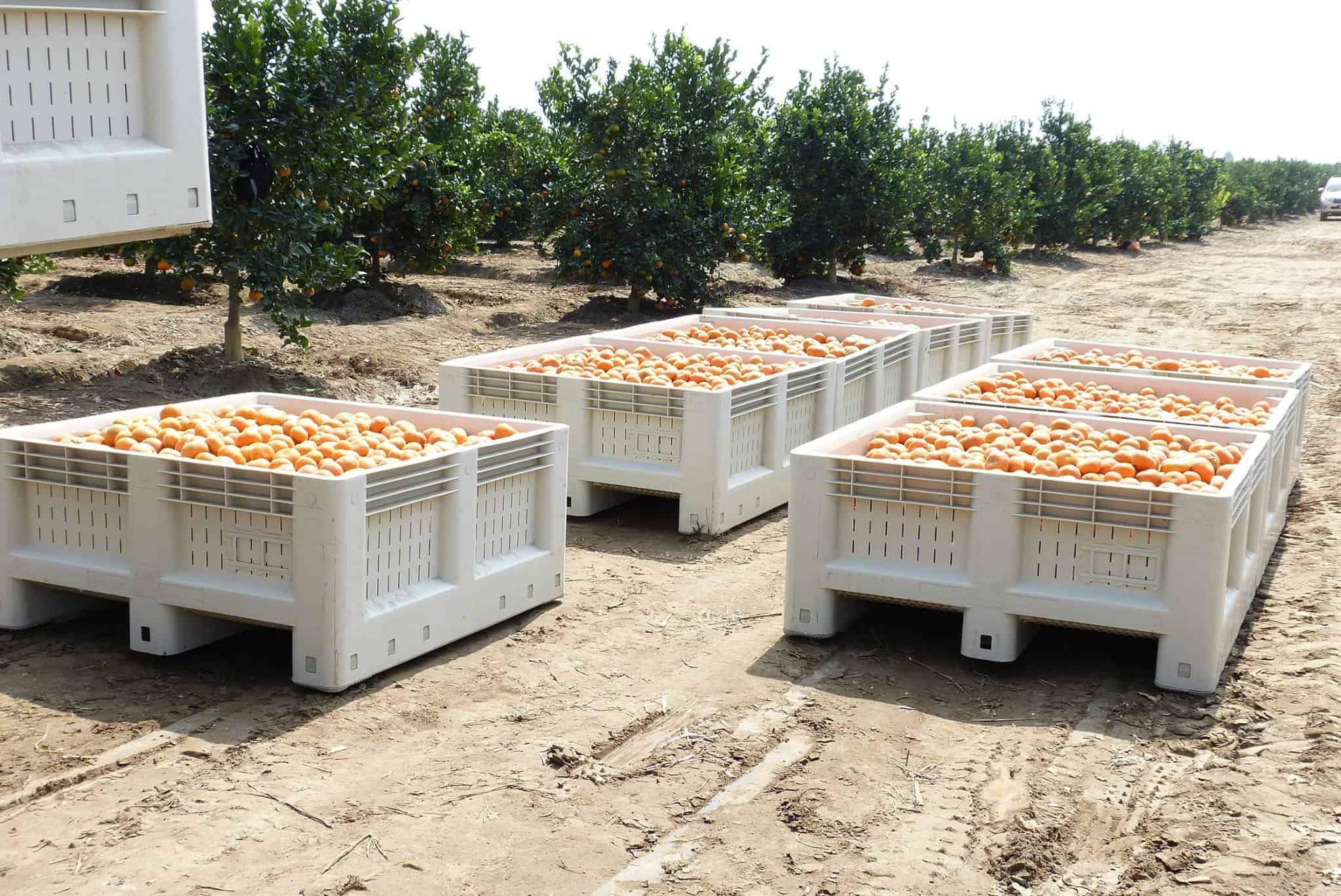Your Ultimate Guide to Plastic Pallets and Bulk Bin Containers
Looking for smarter ways to handle storage and logistics? Plastic pallets and bulk containers are revolutionizing the way businesses store, transport, and manage inventory. They’re durable, hygienic, and sustainable—making them a top choice across industries like warehousing, manufacturing, food distribution, pharmaceuticals, and renewable energy.
But with so many options on the market, figuring out which pallet or container is perfect for your needs can feel a bit overwhelming. That’s where we come in. We’ve put together this simple guide to help you cut through the jargon and find plastic handling solutions that streamline your operations and cut down costs.
Still have questions? We’re here to help. At Pallets & Bins, we work closely with you to identify the best packaging solutions for your specific requirements.
Why Choose Reusable Plastic Packaging?
Plastic pallets and bulk containers provide numerous advantages over traditional packaging like wooden crates, cardboard boxes, and single-use pallets with added benefits. Here’s why they are a smart investment:
-
Built to Last: Made from high-density polyethylene (HDPE) or polypropylene (PP), they handle heavy loads, resist impact, and outlast wood alternatives.
-
Hygienic & Clean: Unlike wood, plastic won’t absorb moisture, making it resistant to mold, bacteria, and pests—an essential feature for food and pharmaceutical industries.
-
Sustainability: Reusable and 100% recyclable, plastic pallets help reduce waste and support environmentally friendly supply chains.
-
Lightweight: Plastic pallets are lighter than wood, reducing transportation costs while maintaining high load capacity.
-
Consistent Quality: No splinters, nails, or broken boards—just smooth, uniform pallets that work well in automated systems.
- Easy to Maintain: Washable and hassle-free, plastic pallets require minimal repairs and are easy to clean.

Types of Plastic Pallets
Plastic pallets come in various styles, each designed for different applications. Here’s a breakdown to help you choose the right one:
-
Rackable Pallets: Designed for secure storage on racks, these pallets provide exceptional strength and stability, making them ideal for warehouse environments. Browse rackable pallets.
-
Nestable Pallets: Featuring a space-saving design, nestable pallets stack inside one another when empty, maximizing storage efficiency. Explore nestable pallets.
-
Stackable Pallets: Built for secure stacking without requiring a racking system, these pallets offer a stable foundation for stored goods. View stackable pallets.
-
Export Pallets: Lightweight and cost-effective, these pallets are perfect for one-way shipping and comply with international export regulations. Find export pallets.
-
Heavy-Duty Pallets: Capable of supporting high weight capacities, these are ideal for industries handling bulk materials and oversized loads. Shop heavy-duty pallets.
- Specialty Pallets: Designed for unique applications, specialty pallets offer tailored solutions for specific industries. For example the PVpallet Series X is a reusable and recyclable pallet engineered for the solar industry. Shop specialty pallets.

Types of Bulk Containers
Bulk containers are essential for efficient material handling across industries like manufacturing, solar and electrical, agriculture, and distribution. These high-capacity containers store, transport, and protect bulk materials while reducing waste and improving efficiency. Whether you need to move heavy parts, electrical wiring, fresh produce, or liquids, there’s a bulk container built for the job. Below are some of the most common types (and the traditional packaging they replace):
-
Collapsible Bulk Containers: These space-saving containers fold down when empty, reducing storage and return shipping costs. They are made of durable plastic and often include drop-down doors for easy access. Available in vented designs for airflow (ideal for perishables) and solid designs for secure storage of dry materials. Replaces: Wooden crates, cardboard boxes, and single-use plastic bins.
-
Pallet Boxes (Bulk Bins): Rigid, high-capacity containers designed for heavy loads and long-term storage. Commonly used in industries like automotive, manufacturing, and recycling. Available in vented styles for moisture-sensitive goods and solid styles for maximum durability. Replaces: Wooden pallet-and-box combinations, metal bins, and disposable bulk packaging.
-
Harvest Bins: Designed for agriculture, harvest bins protect delicate produce during transport and storage. Vented walls improve airflow to maintain freshness, while reinforced corners and smooth interiors prevent bruising. Replaces: Wooden field bins, wire baskets, and cardboard produce boxes.
-
Liquid Bulk Containers (IBCs): Ideal for transporting and storing liquids, intermediate bulk containers (IBCs) feature heavy-duty plastic or metal frames with integrated spouts for easy dispensing. Available in food-grade and industrial-grade models. Replaces: Metal drums, single-use plastic barrels, and disposable totes.

Understanding Load Capacities
Selecting the right pallet or bulk bin container requires knowing how much weight it can handle. Here’s what you need to consider:
-
Static Load: The maximum weight a pallet or bin can hold when resting on a solid surface, typically ranging from 3,000 lbs. to over 10,000 lbs.
-
Dynamic Load: The weight a pallet or bin can support while being moved, often between 1,500 lbs. and 5,000 lbs.
-
Racking Load/Edge Rack Load: The weight a pallet can sustain when placed on a rack without additional support, usually from 1,000 lbs. to 3,000 lbs.
-
Stack Load: The total weight a container or pallet can bear when other loaded containers are stacked on top of it. This is crucial for warehouse storage and transport stability.
- Stack Height: The maximum recommended height that loaded containers or pallets can be safely stacked, ensuring stability and compliance with safety regulations, usually two to six high.

What Type of Plastic is Best? HDPE vs. PP
Plastic pallets and bulk containers are typically made from two main types of plastic, HDPE and PP. Each offers unique benefits for different applications:
-
High-Density Polyethylene (HDPE): This strong, rigid plastic is valued for its durability and long lifespan. HDPE pallets and containers perform well in various conditions, from cold storage to heavy-duty industrial use. They are resistant to moisture, chemicals, and UV exposure, making them a reliable choice for long-term use. Additionally, HDPE is recyclable and widely repurposed into new pallets, containers, and other products, supporting sustainable packaging solutions.
- Polypropylene (PP): A more durable, impact-resistant material, PP provides excellent resistance to chemicals, making it ideal for harsh environments such as pharmaceutical, food processing, and high-temperature industrial settings. While PP pallets and containers are stiffer than HDPE, they maintain strength under heavy loads and resist warping in extreme temperatures.
Both HDPE and PP are commonly used in plastic pallets and bulk bin containers due to their durability, recyclability, and ability to replace traditional materials like wood and metal. By choosing the right plastic type, businesses can ensure long-lasting performance while supporting sustainability efforts.

Custom Packaging Solutions
If your business has specific packaging requirements, consider custom reusable packaging solutions like those offered by PVpallet. Custom packaging is designed to meet the unique demands of your supply chain while enhancing efficiency, durability, and sustainability. Here’s how custom solutions can benefit your operations:
-
Tailored Sizes and Designs: Standard packaging doesn’t always fit every product. Custom solutions are engineered to meet your exact shipping, handling, and storage needs, ensuring better protection and space optimization. Whether you need precise dimensions, specialized inserts (dunnage), or enhanced stacking capabilities, a customized approach can improve efficiency and reduce damage during transport.
-
Reusable and Sustainable Options: Custom packaging isn’t just about fit—it’s also about function. By choosing reusable materials, businesses can significantly reduce waste, minimize reliance on single-use packaging, and cut long-term costs.
-
Branding and Customization: Custom packaging can do more than just protect products—it can also reinforce your brand identity. With options for custom colors, logos, and labeling, businesses can enhance visibility, improve organization, and create a professional, recognizable presence throughout the supply chain.
-
Optimized Handling and Transport: A well-designed custom packaging solution considers the entire logistics process, from warehouse storage to final delivery. Features like ergonomic handles, secure closures, and stackable designs improve handling, enhance worker safety, and maximize transport efficiency.
- Industry-Specific Solutions: Every industry has its own unique packaging challenges. Whether you need reinforced bulk bins for heavy-duty applications or specialized pallets for sensitive equipment, tailored packaging helps meet regulatory and operational requirements.
By investing in custom reusable packaging, businesses can streamline operations, protect products more effectively, and reinforce sustainability initiatives.
Packaging Solutions by Industry
Different industries have unique packaging needs, and selecting the right reusable packaging solution can significantly impact efficiency, cost savings, and sustainability. Here’s how plastic pallets, bulk containers, and other reusable options cater to different sectors:
-
Agriculture & Farming: Farms and food producers rely on ventilated harvest bins and bulk containers to transport fresh produce while preventing bruising and spoilage. Stackable and collapsible agricultural bulk bins improve storage efficiency and ease of handling. Seed bins provide a durable, reusable solution for storing and transporting seeds, ensuring protection from moisture and contamination.
-
Food & Beverage Processing: FDA-approved hygienic plastic pallets and closed-top bulk containers keep food safe from contamination. Nestable beverage pallets streamline distribution for bottling facilities, while insulated bulk containers are ideal for transporting perishable items like dairy, seafood, and meat.
-
Manufacturing & Industrial: Manufacturing plants use heavy-duty rackable pallets to support high-weight capacities and bulk containers with drop doors for easy access to stored materials. Industries handling metal parts, auto components, electrical equipment, or raw materials benefit from impact-resistant PP or HDPE bulk bins designed for rugged environments.
-
Retail & E-commerce: Distribution centers and retail supply chains depend on lightweight, nestable pallets to optimize warehouse space. Collapsible bulk containers help manage high SKU turnover while providing a sustainable alternative to cardboard packaging.
-
Automotive & Heavy Equipment: For the auto industry, custom dunnage containers protect parts such as engines, transmissions, and glass panels during transit. Heavy-duty plastic bulk bins reduce damage and streamline the returnable packaging loop for Tier 1 and Tier 2 suppliers.
-
Pharmaceutical & Healthcare: Sterile environments require hygienic plastic pallets and sealed bulk containers to transport medical supplies while ensuring compliance with regulatory standards. Tamper-proof and trackable packaging solutions help prevent contamination and theft.
-
Solar & Renewable Energy: The solar industry requires specialized packaging to safely transport and store delicate solar panels and renewable energy components. Traditional wood pallets can lead to damage, inefficiencies, and increased waste. PVpallet offers a reusable, protective pallet specifically designed for solar modules, reducing breakage, improving handling, and lowering logistics costs. In addition to impact-resistant plastic pallets, the industry also benefits from custom reusable transport racks and bulk bin containers for mounting hardware, inverters, wire coils, and other solar system components.
-
Waste & Recycling: The recycling industry benefits from durable bulk bins designed for collecting, sorting, and transporting scrap materials, plastics, and e-waste. Reusable large-volume bulk containers help streamline the handling of recyclables while reducing single-use waste.
-
Chemical & Hazardous Materials: For industries dealing with hazardous materials (hazmat), chemical-resistant bulk containers and spill containment pallets are essential. These solutions help prevent leaks and ensure compliance with safety regulations.
- Cold Storage & Distribution: Temperature-sensitive goods require insulated bulk containers and cold chain plastic pallets that can withstand freezing environments without degrading. Closed-loop reusable packaging systems help maintain product integrity during long-haul shipments.

Find the Right Packaging for You
Plastic pallets and bulk containers offer unmatched durability, hygiene, and efficiency for modern supply chains. Whether you need a heavy-duty rackable pallet, a collapsible bulk container, or an export-friendly nestable pallet, making the switch to plastic solutions can streamline operations, reduce costs, and promote sustainability.
Not sure where to start? Contact us and we’ll help you find the best solution for your application.








